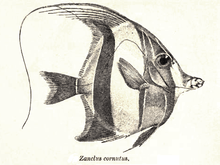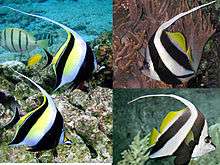Moorish idol
The Moorish idol (Zanclus cornutus) is a marine fish species, the sole extant representative of the family Zanclidae (from the Greek ζαγκίος, zagkios, "oblique") in order Perciformes. A common inhabitant of tropical to subtropical reefs and lagoons, the Moorish idol is notable for its wide distribution throughout the Indo-Pacific. A number of butterflyfishes (genus Heniochus) closely resemble the Moorish idol. It is closely related to, if not a direct descendant of, the extinct Eozanclus brevirostris, from the Middle Eocene of Monte Bolca.
| Moorish idol | |
|---|---|
 | |
| Scientific classification | |
| Kingdom: | |
| Phylum: | |
| Class: | |
| Order: | |
| Family: | Zanclidae |
| Genus: | Zanclus Cuvier in Cuvier and Valenciennes, 1831 |
| Species: | Z. cornutus |
| Binomial name | |
| Zanclus cornutus | |
The Moorish idol got its name from the Moors of Africa, who purportedly believed the fish to be a bringer of happiness. Moorish idols are also a coveted aquarium fish but, despite their abundance and wide array of habitats, they are notoriously finicky and hard to adjust to captivity. Their omnivorous diet can be extremely difficult to replicate in aquaria, as the vegetation which they live on is normally exterminated and they have a habit of eating corals and sponges.
Description

With distinctively compressed and disk-like bodies, Moorish idols stand out in contrasting bands of black, white, and yellow, which makes them attractive to aquarium keepers. The fish have relatively small fins, except for the dorsal fin, whose six or seven spines are dramatically elongated to form a trailing, sickle-shaped crest called the philomantis extension. Moorish idols have small terminal mouths at the end of long, tubular snouts; many long bristle-like teeth line the mouth. The Moorish idol differs from butterflyfish in having a prominent black, triangular anal fin.
The eyes are set high on the fish's deeply keeled body; in adults, perceptible bumps are located above each. The anal fin may have two or three spines. Moorish idols reach a maximum length of 23 cm (9.1 in). The sickle-like dorsal spines shorten with age.
Distribution and habitat
Generally denizens of shallow waters, Moorish idols prefer flat reefs. This fish may be found at depths from 3 to 180 m (9.8 to 590.6 ft), in both murky and clear conditions. Their range includes East Africa, the Indian Ocean, Persian Gulf and the Ducie Islands; Hawaii, southern Japan, and all of Micronesia; they are also found from the southern Gulf of California south to Peru.
Feeding
Sponges, coral polyps, tunicates, and other benthic invertebrates constitute the bulk of the Moorish idol's diet.
Behavior
Often seen alone, Moorish idols also form pairs or occasionally small schools, especially as juveniles. They are diurnal fish, sticking to the bottom of the reef at night, adopting a drab coloration. Like butterfly fish, they mate for life. Adult males display aggression toward one another.
Reproduction
Moorish idols are pelagic spawners; that is, they release eggs and sperm in the water column, leaving fertilized eggs to drift away with the currents. The range of these fish may be explained by the unusually long larval stage. The fish reach a length of 7.5 cm (3.0 in) before becoming free-swimming juveniles.
In the aquarium

Moorish idols are notoriously difficult to maintain in captivity. They require large tanks, often exceeding 380 l (84 imp gal; 100 US gal),[2] are voracious eaters, and can become destructive.[2]
Some aquarists prefer to keep substitute species that look very similar to the Moorish idol. These substitutes are all butterflyfishes of the genus Heniochus, and include the pennant coralfish, H. acuminatus; threeband pennantfish, H. chrysostomus; and the false Moorish idol, H. diphreutes.
Moorish idols typically are very picky eaters. They will either eat nothing (common) and perish or eat everything (uncommon).
Timeline

Synonyms
In popular culture
- In the 2003 Disney/Pixar animated film Finding Nemo, a Moorish idol fish named Gill, voiced by Willem Dafoe, was one of Nemo's tank mates and the leader of the Tank Gang. Gill was depicted having a very strong desire for freedom outside of the aquarium and was constantly scheming to achieve this, possibly alluding to the difficulty of keeping real-life Moorish idols in captivity. Gill and the other members of the Tank Gang appeared in the 2016 sequel, Finding Dory as an Easter egg at the end credits.[4]
- Moorish idols have long been among the most recognizable of coral reef fauna. Their image has graced all types of products, such as shower curtains, blankets, towels, and wallpaper made with an ocean or underwater theme.
References
- NatureServe (2013). "Zanclus cornutus". IUCN Red List of Threatened Species. 2013. Retrieved 15 December 2014.CS1 maint: ref=harv (link)
- http://saltaquarium.about.com/od/tangsurgeonfishprofiles/p/p_moorishidol.htm
- Froese, Rainer and Pauly, Daniel, eds. (2014). "Zanclus cornutus" in FishBase. November 2014 version.
- "Willem Dafoe Returns For 'Finding Dory': 'It's Even Better Than The First'". The Inquisitr. 6 October 2013. Retrieved 6 October 2013.
External links
- Photos of Moorish idol on Sealife Collection
